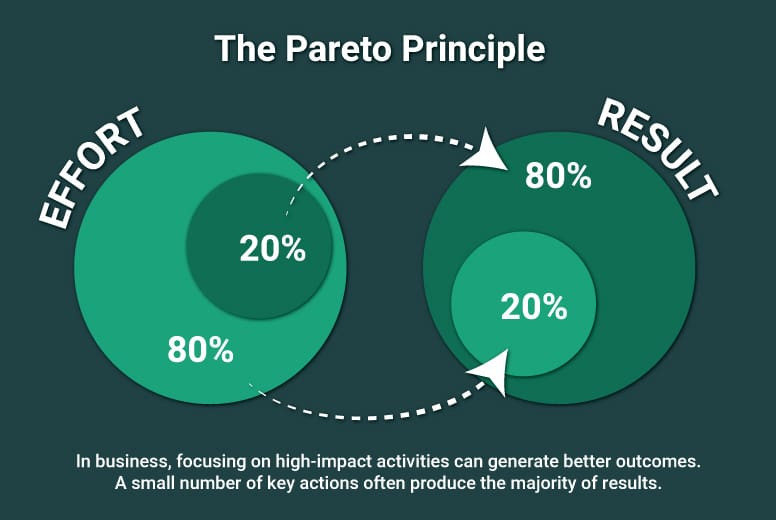
THE 80/20 Rule, also known as the Pareto Principle, states that 80% of outcomes are often generated by 20% of inputs.
In today’s fast paced world, many leaders wear “busy” as a badge of honour.
Packed calendars, endless emails and back to back meetings often feel like progress. Yet, activity is not always productivity.
In fact, leaders often spend 80% of their time on low value tasks that contribute little to overall growth and transformation of their business.
The key to breaking this cycle lies in shifting from busy to impactful; and the 80/20 rule is a powerful starting point.
Understanding the 80/20 rule —80% of results comes from 20% of actions.
The strategic plans formulated by the top-level leadership, aligning systems and team-members to the mission and vision aid the organisation to produce amazing results that could propel the company to greater heights.
In business, it means that 80% of profits come from 20% of customers.
- Out & about: Warner Music Group squashing the impossible
- Ex-ChiTown chamber secretary fails to stop trial
- Parly caucus on PWDs mooted
- Directors call for workplace shift post Covid restrictions
Keep Reading
In life, it follows that 80% of challenges come from 20% of problems.
For leaders, this means that impact is rarely spread evenly.
A small number of focused actions, relationships, and decisions drive the majority of success.
These focused actions help leaders drive strategic direction by prioritising what matters the most to the growth of the business and development of the team.
This also improves the decision making process for the leader by identifying leverage points in the supply chain, thereby increasing profitability because the organization will become laser focused on high value processes, customers and products.
Making the shift: Busy to impactful
Identify your critical 20%: Which tasks truly advance the organisation’s mission?
To run the organisation effectively as a leader, you must identify key areas that need your attention and focus.
The areas could be on evaluation of strategic goals and aligning team members and changing a system for efficiency.
Another key area could be formulating a marketing strategy to venture into a new market or segment.
Which relationships (mentors, partners, and customers) drive significant growth?
Organisations have a symbiotic relationship with their stakeholders, including customers and suppliers among many.
For example, there are some market segments that do not contribute much revenue to an organisation and, as such, after evaluation, the organisation could stop serving such a segment.
Ideally the company would maintain few core relationships that add value to the success of the organisation.
Delegate the 80%: High impact leaders do not do everything themselves.
To effectively lead as a manager, it is prudent to delegate operational tasks to lessen the burden and that gives you space to focus on important tasks such as policy development and strategic planning.
Managers need space to make high-stakes decisions that could contribute to the growth and success of the organisation.
Task or operational managers have to identify potential team members to re-skill and up-skill so that when a task is delegated to them, they will perform it efficiently and effectively.
When leaders are juggling more tasks at the same time, they are likely to make mistakes.
Delegating tasks to capable team members affords managers time to focus on planning and organising for effective management.
Middle level managers must be given authority to make decisions in their respective business units and approach management for consultation and feedback.
For efficiency and smooth running of the business, a leader must automate repetitive processes for efficient running of the business.
Protect your time: As a manager your calendar is a reflection of your priorities.
In planning on how to be a better manager, dedicate time for vision and strategic initiatives.
It is paramount to streamline issues and focus on more important issues that could drive the organisation forward.
There are some meetings that a leader could assign a subordinate to attend so that they can dedicate time to core issues of the business.
Some managers spend much time in meetings and discussing insignificant issues that do not boost efficiency and productivity.
In that regard, spending time at meetings that do not contribute to policy development, co-ordination and directing is a waste of time.
Create some white space in your calendar to help you gain control of your schedule.
White space is a concept that was coined by Julliet Funt, it is a strategic pause; the open time between activities that allows you as a leader to reflect, think creatively, strategise deeply and regain energy.
It is an antidote to burnout and busyness, and a leadership discipline that separates reactive managers from visionary leaders.
Build high value relationships: Do not just invest in relationships through mentoring, listening and collaboration.
High value relationships can be built by connecting authentically and strategically at a deeper level with people who align with your vision, values and long term goals.
These types of relationships become multipliers of growth, influence, trust and impact.
Meeting strategic people could lead to collaborations which could be key in venturing into new markets.
Track and refine: Leadership impact is a moving target.
Regularly assess which 20% of tasks, people or decisions currently produce results?
What should shift as markets, teams and opportunities evolve?
Adapt your focus to stay ahead change.
Review meetings and evaluations must be routinely held to measure whether every team member and business unit, systems and processes are still aligned to the strategic vision of the organisation.
Evaluation leads to transparency and accountability since every member of the organisation contributes during review meetings, which, in turn, leads to diversity of ideas and refined decisions.
Moving from busy to impactful requires courage to say no to what does not matter, discipline to focus on what doe, and clarity of vision.
Leadership is clearly not about doing more; it’s about doing what matters most, better.
- IInnocent Hadebe, with 25 years of experience and credentials as a John Maxwell certified business coach, serves as a trusted executive advisor through Innocent Leadership Group (ILG), empowering global leaders to think boldly, lead transformational change and turn operational complexity into measurable success










